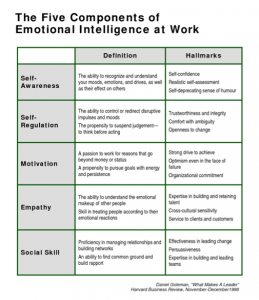 I’m just going to say it: the smartest person in the company often isn’t the best leader and the hardest working person won’t inspire others by putting out enormous effort. Smart and hard-working people get promoted (for a while) because their personal traits are admired.
I’m just going to say it: the smartest person in the company often isn’t the best leader and the hardest working person won’t inspire others by putting out enormous effort. Smart and hard-working people get promoted (for a while) because their personal traits are admired.
But their rise won’t create a better place to work or a more profitable company. In fact, it often does the opposite. Businesses break as they grow because the traits of a great leader are very different from those of a great worker.
The only way to be a great leader is to emotionally connect with the people who work with and for you.
Emotional leadership
If you think about your favorite people from your life — the ones that really impacted you and made you want to do something bigger and better, they were people you connected with emotionally. It was a math teacher in high school who made geometry interesting. It was the boss you had in your first job that made low pay and lousy work bearable. Later, it was the kind and selfless leader that didn’t seem to care about their own power and position, but about your needs and goals. You felt they had your back.
Too many leaders expect their subordinates to have their backs yet don’t have the backs of their team members. This is very, very common. And very flawed.
If it’s true in the military…
My husband flew for the Navy and he’s fond of saying that the best officers didn’t command anyone with orders and salutes. They led sailors capably because they were emotionally connected to their team. The mission was a shared goal that required collaboration. They were honest and transparent and were willing to let subordinates lead as well. If that’s the case within the rigid structure of the military, it is far more so in the non-military world.
His favorite story came from his first job with Perot Systems in Minneapolis. A customer asked about his past, and then said, “Well, it was easy to lead in the military because you could give an order.” His response was, “You could punish a sailor once for not obeying and it was on them, but the second time someone disobeyed, it was on you.”
The best leaders know it
The best leaders know that while work isn’t a democracy (and only a weak leader would utter those words), following emotionally is a personal choice each subordinate member makes. Individuals can do everything the boss demands, but if they aren’t emotionally inspired, they aren’t led.
 This is why the book Emotional Intelligence by Daniel Goleman was such a hit when it came out in 1996 (and still sells well today). Great leaders work with emotional intelligence so that their leadership connects emotionally. As the subtitle of the book says, “Why it can matter more than IQ.”
This is why the book Emotional Intelligence by Daniel Goleman was such a hit when it came out in 1996 (and still sells well today). Great leaders work with emotional intelligence so that their leadership connects emotionally. As the subtitle of the book says, “Why it can matter more than IQ.”
Harvard Business Review summarizes Goleman’s vision in What Makes a Leader:
Goleman found that while the qualities traditionally associated with leadership—such as intelligence, toughness, determination, and vision—are required for success, they are insufficient. Truly effective leaders are also distinguished by a high degree of emotional intelligence, which includes self-awareness, self-regulation, motivation, empathy, and social skill.
It certainly has nothing to do with whether a leader charms or scares their employees into having their back.
Emotional leadership takes emotional intelligence
It’s common to fall into our own strengths when we lead — the things we can easily control like how prepared we are or how much output we create. But real leadership requires much more than what got us to that point in our career. Each promotion and each increase in responsibility is a higher level of the emotional intelligence game.




 All Things D
All Things D ARS Technica
ARS Technica Engadget
Engadget GigaOM
GigaOM Mashable
Mashable TechCrunch
TechCrunch The Verge
The Verge Venture Beat
Venture Beat Wired
Wired Chris Brogan
Chris Brogan Brian Solis
Brian Solis Chris Dixon
Chris Dixon Clay Shirky Blog
Clay Shirky Blog HBR Blog
HBR Blog IT Redux
IT Redux Jeremiah Owyang
Jeremiah Owyang Radar O'Reilly
Radar O'Reilly Seth Godin Blog
Seth Godin Blog SocialMedia Today
SocialMedia Today Solve for Interesting
Solve for Interesting The TIBCO Blog
The TIBCO Blog Lifehacker
Lifehacker
